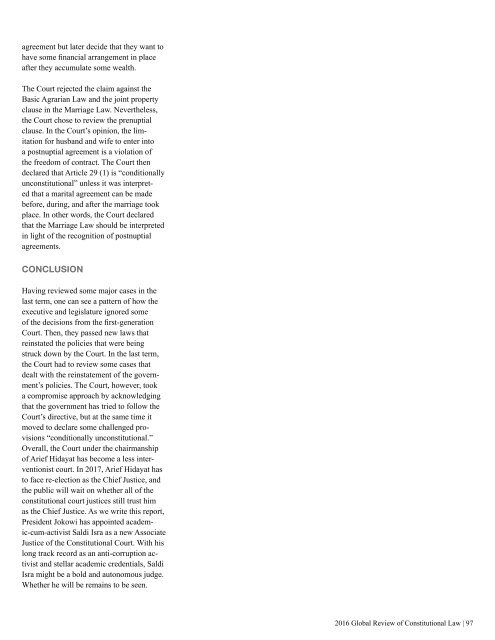2016 Global Review of Constitutional Law
I-CONnect–Clough Center collaboration.
I-CONnect–Clough Center collaboration.
You also want an ePaper? Increase the reach of your titles
YUMPU automatically turns print PDFs into web optimized ePapers that Google loves.
agreement but later decide that they want to<br />
have some financial arrangement in place<br />
after they accumulate some wealth.<br />
The Court rejected the claim against the<br />
Basic Agrarian <strong>Law</strong> and the joint property<br />
clause in the Marriage <strong>Law</strong>. Nevertheless,<br />
the Court chose to review the prenuptial<br />
clause. In the Court’s opinion, the limitation<br />
for husband and wife to enter into<br />
a postnuptial agreement is a violation <strong>of</strong><br />
the freedom <strong>of</strong> contract. The Court then<br />
declared that Article 29 (1) is “conditionally<br />
unconstitutional” unless it was interpreted<br />
that a marital agreement can be made<br />
before, during, and after the marriage took<br />
place. In other words, the Court declared<br />
that the Marriage <strong>Law</strong> should be interpreted<br />
in light <strong>of</strong> the recognition <strong>of</strong> postnuptial<br />
agreements.<br />
CONCLUSION<br />
Having reviewed some major cases in the<br />
last term, one can see a pattern <strong>of</strong> how the<br />
executive and legislature ignored some<br />
<strong>of</strong> the decisions from the first-generation<br />
Court. Then, they passed new laws that<br />
reinstated the policies that were being<br />
struck down by the Court. In the last term,<br />
the Court had to review some cases that<br />
dealt with the reinstatement <strong>of</strong> the government’s<br />
policies. The Court, however, took<br />
a compromise approach by acknowledging<br />
that the government has tried to follow the<br />
Court’s directive, but at the same time it<br />
moved to declare some challenged provisions<br />
“conditionally unconstitutional.”<br />
Overall, the Court under the chairmanship<br />
<strong>of</strong> Arief Hidayat has become a less interventionist<br />
court. In 2017, Arief Hidayat has<br />
to face re-election as the Chief Justice, and<br />
the public will wait on whether all <strong>of</strong> the<br />
constitutional court justices still trust him<br />
as the Chief Justice. As we write this report,<br />
President Jokowi has appointed academic-cum-activist<br />
Saldi Isra as a new Associate<br />
Justice <strong>of</strong> the <strong>Constitutional</strong> Court. With his<br />
long track record as an anti-corruption activist<br />
and stellar academic credentials, Saldi<br />
Isra might be a bold and autonomous judge.<br />
Whether he will be remains to be seen.<br />
<strong>2016</strong> <strong>Global</strong> <strong>Review</strong> <strong>of</strong> <strong>Constitutional</strong> <strong>Law</strong> | 97


